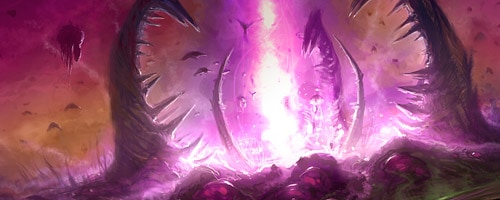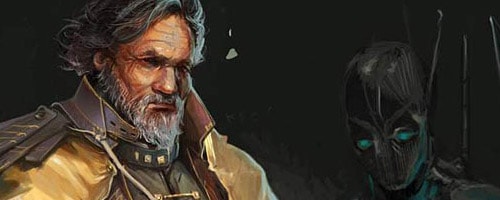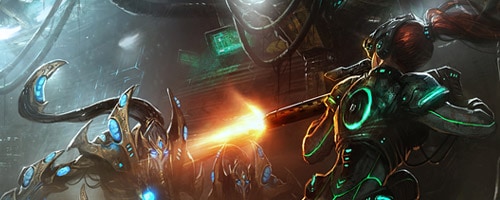Starcraft 2 news » StarCraft II Creative Development Q&A - Part 3
In part three of our continuing series, Brian Kindregan, co-lead writer of StarCraft II: Wings of Liberty and lead writer of Heart of the Swarm, answers more of the community’s most burning lore questions.
Question: When it was created, the Overmind was not given free will. It was instead given a direct order: to consume the protoss. But then the Overmind created Kerrigan as a hope of salvation. So, what kind of control did the Dark Voice have over the Overmind?
Answer: Great question. I know there's been some debate on the forums about the nature of free will and the Overmind. I've seen a lot of discussion on the topic, framed in terms of free will as it applies to humans and the human condition. But it's important to remember that this is science fiction, and we will sometimes need to use terms on a grander scale than in contemporary definitions.
Specific to the Overmind: One either has free will, or one does not. But if one does not, there are degrees of non-free will. The Dark Voice put the Overmind in charge of the Swarm, which meant the Overmind needed broad latitude in its thinking: discretion, the ability to make choices, and long- and short-term planning. Flexibility. It could not be an automaton. So, did the Overmind have free will? No, because the Dark Voice put parameters on its thinking. It could not flat out consider rebellion, for instance. If it tried, iron-clad controls would clamp down. There were compulsions it had to follow in certain situations. The Overmind, determined to do what it could for the Swarm, found the cracks, the barely permissible choices that it could make—the moves that would not activate the controls but which it hoped could eventually free the zerg from the Dark Voice's control. In turn, this would let the zerg evade the fate the Overmind had seen in its vision.
And to clarify something that I've seen widely misinterpreted, the Overmind did not create the Queen of Blades to save the galaxy, the Koprulu sector, or anything besides the zerg. The Overmind saw a vision in which the zerg were used to kill the protoss, and only the fact that the zerg were slaves bothered it. The end of that vision showed all the zerg being sucked dry by hybrid. It represented the destruction of the zerg, and that was what the Overmind wanted to prevent. It wished to move the Swarm out from the Dark Voice's control to save the zerg—and only the zerg. The Overmind would have been happy to see the zerg consume every other species in existence.
Question: Who specifically was Tychus working for, and what were his instructions? If he was working for Arcturus, the events of "Media Blitz" are a bit incongruous, since it seems unlikely that Mengsk would have been okay with ruining the big Odin unveiling and broadcasting the tape of the Confederate adjutant.
Answer: I'm particularly glad this one was asked, as I answered it at BlizzCon a few years ago and gave kind of a jumbled response.
The shortest version is, by the time of "Media Blitz" (which comes mid/late in the game no matter how you play it); Mengsk already had much bigger fish to fry. He had one chance to play his Tychus card; if he'd ordered Tychus to sabotage that mission, Raynor would have been on to him. If "Media Blitz" had happened as the third or fourth mission of the game, Mengsk would have played that card immediately. But by the time Tychus was stomping around Korhal, Mengsk was facing a zerg Swarm boiling off of Char and taking worlds. He had spies telling him that the Moebius Foundation might have found a way to make Kerrigan human again. He took damage from "Media Blitz," but it was nothing compared to the danger of the Swarm and the potential reward of using Tychus against Kerrigan.
After all, if Mengsk defeated the Swarm, his people would adore him even if he had a few billion deaths on his hands. If the Queen of Blades came after him . . . the adoration of his people wouldn't save him.
Nerves of steel, that Mengsk.
Question: Does the gift of prophecy and foresight that played such a big role in WoL have any grounding in a science-fictiony explanation, or is it just mysterious and paranormal?
Answer: I totally understand. "Prophecy" is a loaded word that seems like something from a fantasy story, with no place in science fiction.
However, I'd like to invoke Clarke's third law: "Any sufficiently advanced technology is indistinguishable from magic." Some entity in the distant past saw how events were very likely to play out—not destined to—and transmitted that information to lesser beings, who wrote it down.
To put it another way, let's say I can communicate with a mayfly that has a 24-hour lifespan, and I tell that mayfly, “That giant ball of light will go down soon, in an event we call 'evening.' It will be gone for almost half your life, but it will come back, in an event we call 'morning.'" To that mayfly, I seem to be throwing out wild prophecies about the future.
I've noticed that a lot of people think the prophecy says Kerrigan will save the universe. It doesn't. It says a few things. Among them is the fact that the Fallen One (hereafter referred to as the Dark Voice) will destroy everything. At a later point, we see a vision that the Overmind had, which shows us the moment when the Dark Voice wins the day. In that vision, there is a very strong sense that if the zerg had been under the command of a leader who could resist the Dark Voice, they could have fought back. Is Kerrigan such a leader? Certainly! But she's not the chosen savior, or a messianic figure, or the "prophesied one"; she's not in the prophecy at all. Is that complicated? Yeah, it is. I have something to say about that in a later post!
If you’re looking for more lore, here’s part 1 of our StarCraft II Creative Development Q&A, and here’s part 2. We’ll have many more answers to your burning questions in the weeks to come.


















 Update comments
Update comments